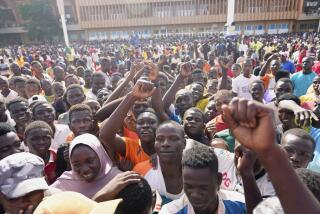AFRICA / RECIPE FOR DISASTER : 2 Liberia Factions and Peacekeepers Keep War Boiling
- Share via
NAIROBI, Kenya — Not very long ago, it was an article of faith among Liberians anxious to see an end to their country’s civil war that peace would return when President Samuel K. Doe left.
Doe was captured by rebels and slain a month ago, and things have only become worse.
Today, three armies, including a “peacekeeping” force deployed by five members of the Economic Community of West African States (ECOWAS), are engaged in full-scale war in and around the capital, Monrovia. Neither an end nor a predictable outcome of the nine-month-old war is in sight.
In recent days, the West African force has gone on the offensive, strengthened by the assignment of a Nigerian combat officer as its field commander. Nigerian planes have bombed positions held by Charles Taylor, the strongest and most obdurate rebel leader, and soldiers of the 6,000-strong force have moved into Monrovia from their base at the city’s port.
But like all previous developments in this vicious conflict, these developments only further cloud the future of what was always one of Africa’s most unruly lands.
Liberians in exile and other observers believe that the political and social structure of the country has been so shattered by the length and ethnic nature of the civil war that it could take years to restore genuine order after the fighting stops.
“So many of the assumptions about how Liberia works have been destroyed,” said one longtime observer of the country, “that it’s not clear how the people are going to organize themselves into a political structure.”
The progression of tragedy has confounded Liberians and foreigners alike. When a group of prominent Liberian exiles met in August in Banjul, Gambia, to nominate a provisional president and government to take over after the West African task force landed, they assumed that an end to the turmoil was just around the corner.
“They thought they would be in Monrovia by the end of September,” says Ellen Johnson-Sirleaf, an exile who participated in the meeting but declined a post in the provisional government. “They thought that by this time everybody would be sitting around a table to negotiate.”
Instead, the weeks since then have been a succession of slim hopes violently dashed.
When the two opposing rebel armies, under Taylor and his rival, Prince Yormie Johnson, arrived in Monrovia about the beginning of June, most observers believed that Doe’s departure from office was the only way to restore order. But his death at Johnson’s hands has added to the turmoil. Taylor declared a cease-fire late last month, but it collapsed days later after Johnson’s forces unearthed a cache of ammunition hidden by Doe’s forces and again opened fire on Taylor.
“I guess Doe was right,” said a dispirited Johnson-Sirleaf, who once served in the Doe government but later fled the country and now works as an international banker in Washington. “He said his death would only cause more chaos.”
One disappointment to many leading Liberians outside the country has been the performance of the West African task force. The detachment’s original assignment, to monitor a cease-fire, was its first problem because there was no cease-fire to monitor when it landed Aug. 24. It has been hampered by the absence of a clear objective ever since.
Even now, with the task force on the offensive, some observers question how long it can continue to fight Taylor. Taylor is convinced that its principal objective is to deprive him of power, and the force’s sponsoring countries are not likely to have the resources or will to pursue a sustained campaign.
Others complain that under Nigerian leadership, the task force’s “peacekeeping” portfolio has been discarded. “I’m disappointed with the ECOWAS view now that this has to be won by military means, not by compromise and negotiation,” said Johnson-Sirleaf.
Christopher Clapham, a professor at Britain’s University of Lancaster and an authority on Liberian politics, said: “You have a West African force going about in a strange country, with little financial backing and little idea about what kind of political system it should set up. That’s a recipe for disaster.”
Leaving Taylor in nominal control of the country is not itself a guarantee of order. Taylor’s own force is largely disorganized, and his control over his own deputies is dubious; at least one has already set himself up as an independent warlord.
More to Read
Sign up for Essential California
The most important California stories and recommendations in your inbox every morning.
You may occasionally receive promotional content from the Los Angeles Times.










